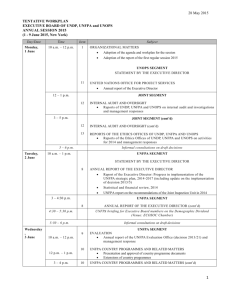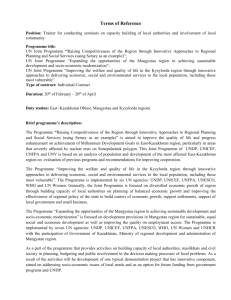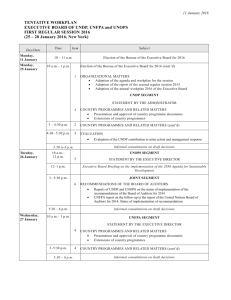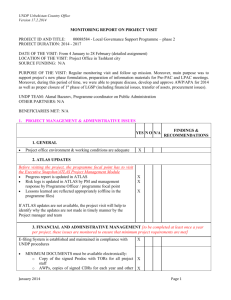Word - UNDP
advertisement
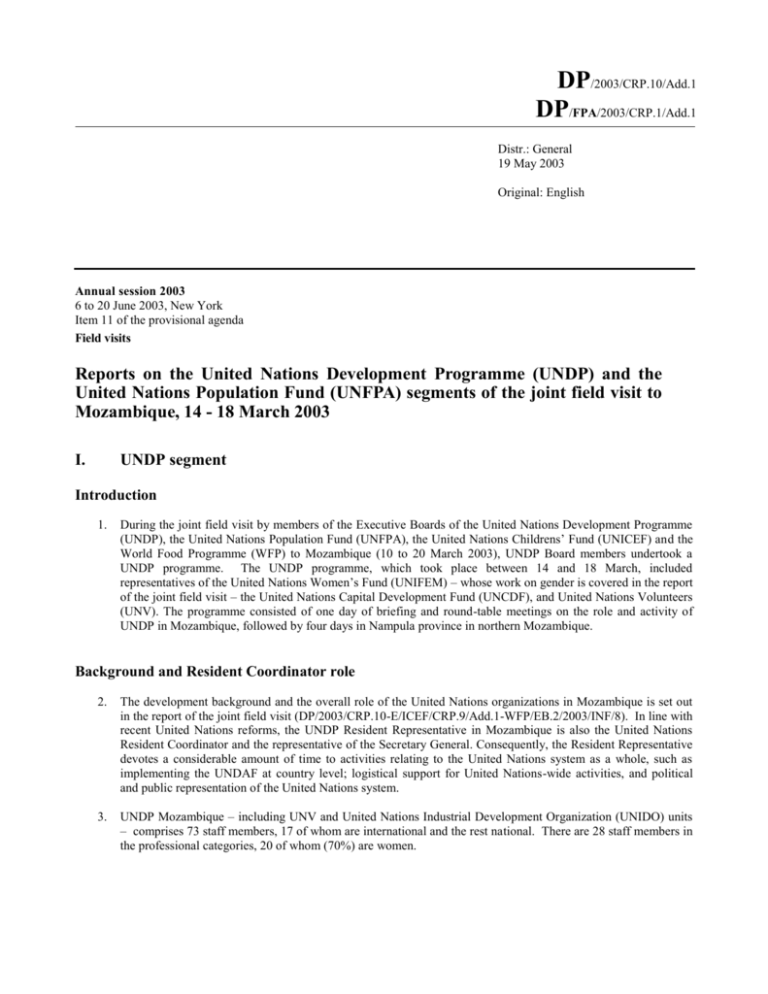
DP/2003/CRP.10/Add.1 DP/FPA/2003/CRP.1/Add.1 Distr.: General 19 May 2003 Original: English Annual session 2003 6 to 20 June 2003, New York Item 11 of the provisional agenda Field visits Reports on the United Nations Development Programme (UNDP) and the United Nations Population Fund (UNFPA) segments of the joint field visit to Mozambique, 14 - 18 March 2003 I. UNDP segment Introduction 1. During the joint field visit by members of the Executive Boards of the United Nations Development Programme (UNDP), the United Nations Population Fund (UNFPA), the United Nations Childrens’ Fund (UNICEF) and the World Food Programme (WFP) to Mozambique (10 to 20 March 2003), UNDP Board members undertook a UNDP programme. The UNDP programme, which took place between 14 and 18 March, included representatives of the United Nations Women’s Fund (UNIFEM) – whose work on gender is covered in the report of the joint field visit – the United Nations Capital Development Fund (UNCDF), and United Nations Volunteers (UNV). The programme consisted of one day of briefing and round-table meetings on the role and activity of UNDP in Mozambique, followed by four days in Nampula province in northern Mozambique. Background and Resident Coordinator role 2. The development background and the overall role of the United Nations organizations in Mozambique is set out in the report of the joint field visit (DP/2003/CRP.10-E/ICEF/CRP.9/Add.1-WFP/EB.2/2003/INF/8). In line with recent United Nations reforms, the UNDP Resident Representative in Mozambique is also the United Nations Resident Coordinator and the representative of the Secretary General. Consequently, the Resident Representative devotes a considerable amount of time to activities relating to the United Nations system as a whole, such as implementing the UNDAF at country level; logistical support for United Nations-wide activities, and political and public representation of the United Nations system. 3. UNDP Mozambique – including UNV and United Nations Industrial Development Organization (UNIDO) units – comprises 73 staff members, 17 of whom are international and the rest national. There are 28 staff members in the professional categories, 20 of whom (70%) are women. DP/2003/CRP.10/Add.1 DP/FPA/2003/CRP.1/Add.1 Second country cooperation framework (CCF) for Mozambique: 2002-2006 4. The second CCF for Mozambique was approved by the UNDP/UNFPA Executive Board in September 2001 with a resource envelope of approximately $96 million (of which a third was from core resources, the balance to be mobilized from third parties and trust funds). The priorities of the CCF relate directly to the national development strategy contained in the poverty reduction strategy paper (PRSP)/Action Plan for Reducing Absolute Poverty (PARPA) and the contribution of the United Nations set out in the common country assessment (CCA)/United Nations Development Assistance Framework (UNDAF) 2002-20061. The CCF incorporates UNDP leadership and the Millennium Development Goals, taking into account the national development priority target of reducing the incidence of absolute poverty in Mozambique by 30% by 2010. In its contribution to the CCA/UNDAF, the CCF focuses on two thematic areas – Poverty Reduction and Democratic Governance – with three cross cutting issues, gender, HIV/AIDS and information and communications technology (ICT) for development. 5. Under poverty reduction – and the related priority of tackling HIV/AIDS - UNDP has a number of interventions, including: promotion of pro-poor macro-economic and employment policies and strategies; the cultivation of an enabling environment for micro and small scale enterprise development; and supporting initiatives to reduce the development impact of HIV/AIDS. Under democratic governance UNDP supports efforts to strengthen key democratic institutions (including parliament and electoral systems, police and justice systems and the media); enhance the effectiveness of selected public sector institutions; and promote participatory local governance and decentralization. 6. The CCF promotes a two-pronged intervention strategy: (a) upstream policy formulation and advocacy for an enabling regulatory environment and legislation to promote poverty reduction and democratic governance; and (b) institutional development coupled with highly selective downstream activities linked to upstream interventions. Programme activities by theme 7. A. 1 2 The UNDP Board Members had round-table discussions with the UNDP Country Office staff in connection with: poverty and HIV/AIDS; democratic governance; ICT for development; and the United Nations Volunteers (UNV). Action on these issues, as well as on support to mine action, disaster prevention and management, and the United Nations Capital Development Fund (UNCDF), was covered during the visit to Nampula Province. Poverty Reduction and HIV/AIDS 8. UNDP interventions take place at the central level (capacity building; support for the PARPA; the National AIDS Council and the MDG report) and at the local level (decentralized monitoring of the PARPA; community based poverty-reduction activities). In particular UNDP took the lead with the Government of Mozambique in preparing the first national MDG report, in February 2002, and providing technical support for mainstreaming the MDG into the PARPA, thus integrating the respective monitoring and evaluation mechanisms. 9. The work of the Poverty Reduction and HIV/AIDS Unit breaks down into three focus areas: employment generation through enterprise promotion; promotion of community-based poverty initiatives; and mitigation of the socio-economic impact of HIV/AIDS. UNDP works with a wide range of partners in its poverty reduction and HIV/AIDS work, including other United Nations agencies (such as UNAIDS, UNIDO and UNCDF), CCA/UNDAF priorities are to promote the right to: a) personal security; b) knowledge and a long an d healthy life; c) sustainable livelihoods; d) full participation, equity and protection. For further details, see the report of the joint fiel d visit. DP/2003/CRP.10/Add.1 DP/FPA/2003/CRP.1/Add.1 multilateral agencies (including the World Bank, the African Development Bank and the European Union) and bilaterals from the official and non-governmental sectors. 10. On employment generation, UNDP has worked on microfinance initiatives which are being scaled up from the local level, including through capacity building of government officials. Community based initiatives, such as the programme visited in Nampula province, have contributed to developing mechanisms for district planning and finance. Again, the approach pays great attention to developing local government capacity and scaling up local projects by multiplying the experience of district or provincial level projects to the national level. On HIV/AIDS, the second CCA/UNDAF (2002-2006) agreed that the United Nations system in Mozambique would commit at least 25% of the resources from respective agencies to interventions aimed at halting and reversing the spread of the disease. UNDP response has included capacity building for the National HIV/AIDS Council and the Ministry of Health, and mainstreaming of HIV/AIDS into other projects and programmes, as well as into the PRSP/PARPA. B. Democratic governance and decentralization 11. Work on democratic governance and decentralization also covers activity connected with the environment and sustainable rural development. Technical support and capacity building take place in the areas of justice, law and order, public sector reform, transparency and accountability, parliament, media and elections. Many of these are financed through cost sharing with one or more bilateral partners for whom the United Nations system is a neutral facilitator of a sensitive activity. UNDP has in the past been asked by both the Government and the donor community to coordinate external support for national elections. It expects to do so again for municipal elections in 2003 and national elections in 2004. 12. Under environment and rural development, UNDP has provided technical support for sectoral agriculture programmes, the National Water Directorate, and the Ministry of Environment and Rural Development. In particular, UNDP has worked closely in a sector-wide approach (SWAP) arrangement with the World Bank, the Food and Agriculture Organization (FAO), the International Fund for Agricultural Development (IFAD) and several bilateral donors to support the agricultural sector through the Agricultural Sector Public Expenditure Programme (PROAGRI). A similar arrangement has been put in place to support the development of a Rural Development Strategy, paying particular attention to the needs of the disaster-prone rural areas. 13. Work on decentralization includes capacity building of national and local authorities working on public administration. The example observed in Nampula province was a UNDP/UNCDF pilot that supported provincial and district workers developing community-based systems for district planning and finance. The pilot promoted transparent and participatory decision-making to generate local ownership of expenditure decisions financed from both provincial funds and external assistance. This successful programme has been repeated by UNDP/UNCDF in Cabo Delgado province and adopted in four central provinces through a World Bank International Development Association (IDA) credit. It has also been adopted by the Government as the basic model for district planning and finance in Mozambique. C. ICT for development 14. Since 2002, UNDP has supported Mozambique’s policies to promote development through ICT, including through technical support for the 2002 national ICT Policy Implementation Strategy. UNDP offers support at the policy strategy level; in specific programmes and projects at both national level (such as training public sector leaders in ICT for Development) and provincial level. Mozambique is recognized as quite advanced in ICT for Development strategy. But significant capacity, human resource, infrastructure and regulatory challenges remain. 3 DP/2003/CRP.10/Add.1 DP/FPA/2003/CRP.1/Add.1 D. United Nations Volunteers 15. The United Nations Volunteers (UNV) have been supporting the United Nations system in Mozambique since 1977, with more than 680 volunteers. In the transition period that began in 1994, they were primarily supporting United Nations priority activity in the election and demobilization/reintegration areas. There are currently 80 United Nations Volunteers in Mozambique, working with WFP, UNDP, UNFPA, UNICEF and FAO on a range of MDG-supporting activities that include humanitarian relief, maternal health training and HIV/AIDS awareness programmes. E. Disaster preparedness and demining 16. Briefing on disaster preparedness and demining was received during the visit to Nampula province. On disaster preparedness, UNDP has provided capacity building support to the National Institute for Disaster Management (INGC) and is a part of the United Nations Disaster Management Team to mitigate the impact of the current humanitarian situation. UNDP continues to provide technical assistance to the INGC in disaster preparedness and planning and management. In Nampula Province the Board members spoke to authorities to learn how disaster contingency planning was being incorporated into local decision-making at the provincial level. 17. UNDP support to the National Demining Institute (IND) follows its long involvement in demining activity in Mozambique. IND replaced the National Demining Commission in 1999 – with technical support from UNDP – and represented a shift towards a more strategic approach to handling the post-conflict legacy of landmines. Despite improvements in coordination, there are still difficulties in getting full information on demining activity and results from across the various non-governmental organizations (NGOs) and private sector companies active in the country. UNDP is in the progress of integrating mine action into the PARPA. Concern about landmines directly impacts on poverty in a number of ways – by constraining the ability to cultivate on large areas of land which have not been certified mine-free, for example. UNDP also supplies IND with five technical advisers and supports the mobilization of resources for continued demining activity. Visit to Nampula province 18. In addition to talks with regional demining and disaster management offices, the visit to Nampula province allowed the Board members to view the UNDP/UNCDF decentralized district planning and finance programme first hand. The visit included briefings with the Governor and his team in Nampula town; and a visit to Mecuburi district to discuss the programme with the district administrator and his team and view projects they were implementing with UNCDF/UNDP and other donor support. The district planning team explained how, through village level consultative councils, they were making decisions about which health, education and infrastructure investments to make; tracking progress against indicators on such issues as HIV/AIDS and participation rates at school; and ensuring that local ownership resulted in commitment – to the maintenance of roads, for example. Conclusions 19. This report can only reflect impressions based on fairly brief, albeit intense, exposure to UNDP activity in Mozambique. Broad observations from Board Members are as follows: (a) The UNDP team in Mozambique has a clear understanding of the process of UNDP reform being discussed by the Executive Board. Its work reflects demands for greater coordination and coherence across the United Nations agencies, under the UNDAF and in line with the national poverty reduction strategy (PRSP/PARPA). 4 DP/2003/CRP.10/Add.1 DP/FPA/2003/CRP.1/Add.1 Details of the coordination role of the resident coordinator’s office are appraised positively in the report on the joint field visit. (b) The highest priority intervention areas for UNDP Mozambique – poverty eradication and HIV/AIDS, and democratic governance. – reflect the priorities of both the Government of Mozambique and the Executive Board. (c) UNDP Mozambique, like many other country offices, has undergone a difficult transition phase to adjust to the new alignment of the organization. There has been a significant shift in focus from project-based activity to greater donor coordination, upstream interventions on development policy – MDG reporting and the Human Development Report, for example – and technical assistance and capacity building at the national level. This shift is reflected in human resources and office structure changes reflect this – and the participants in the joint field visit did not underestimate the scale of the change. (d) Work in supporting the National HIV/AIDS Council, public sector reform, police reform, the National Demining Institute and the National Institute for Crisis Management reflects the upstream focus. UNDP appears to be working well with other United Nations agencies and development partners in these areas. (e) Downstream, regional level activity continues and, as the example of the district planning and financing work in Nampula illustrates, is of value not only in development impact on local communities, but also as a contribution to best practice for “scaling up” to the national level (where the World Bank and the national Government have recognized the potential of this model of decentralized planning and finance). (f) While Board Members recognize the value of both the upstream and downstream work of UNDP – which are usually complementary – UNDP needs to continue its efforts to combat the risk of spreading its activities too thinly, and ensure prioritization in areas of comparative advantage and added value. The Mozambique team is working hard in this direction, but it is a challenge that all UNDP country offices must face in responding to the call for reform. (g) There may be some way to go for full donor/World Bank recognition of the new UNDP changed role as a key partner in development policy dialogue. Further strengthening of relations with the Bank in particular – perhaps through the MDG/PARPA work – will help. If this is indeed the role that the Board seeks for UNDP, then its bilateral representatives should also add their support. (h) Like all other development partners, the challenges facing UNDP in Mozambique are: weak local capacity, human resources, governance and infrastructure; and a high degree of dependency on development assistance. So it needs to remain alert to the need to build sustainability into its programmes and design exit strategies into its interventions. (i) The human resources challenge is particularly acute in public administration, where competition from greater financial opportunities overseas and in the private sector makes it hard to attract high-quality staff. This is particularly severe at the regional and local levels, where additional incentives are needed to relocate staff to regions with weak infrastructure and inadequate social services. Notwithstanding the high quality of some of the individual officials who met the Board team, strengthening the quality of local capacity is a major task for the entire development community. (j) Board members, while recognizing the importance the Mozambican Government attaches to the ICT for development agenda, encourages it and UNDP to remain alert to the many constraints – including on human capacity, infrastructure and regulatory environment – that Mozambique faces in this area. The ICT theme was one of a number of issues in which the potential for south-south cooperation and shared understanding through Board visits was demonstrated by interventions from Board members from developing countries. 5 DP/2003/CRP.10/Add.1 DP/FPA/2003/CRP.1/Add.1 20. Finally, the UNDP Board Members would like to reiterate their thanks for the excellent briefing and support provided by the UNDP staff, and wish them well in their continuing efforts to support development in Mozambique. II. UNFPA segment 21. The mandate of UNFPA is of high relevance to Mozambique. The country falls far behind in reaching the International Conference on Population and Development (ICPD) goals. The situation is characterized, inter alia, by an extremely low contraceptive prevalence rate (4.3 per cent), one of the highest ratios of maternal mortality in the world (1 500 per 100 000 live births), and limited access to emergency obstetric care services (birth with skilled attendants rate is 44.2 per cent), and a high HIV/AIDS prevalence rate (13 per cent). Mozambique has a relatively high and unbalanced population growth rate, and the institutional and technical capacity for integration of population issues, gender and HIV/AIDS concerns into development policies and plans is still limited. 22. In the course of the Executive Board visit the delegation had meetings with UNFPA country office staff and visited a number of UNFPA projects in Maputo, the Gaza province and the Zambezia province The delegation had meetings with the Governors, sectoral provincial Directorates, and district officials (the list of projects visited is attached). 23. UNFPA has been operating in Mozambique since 1978. The present country programme for 2002-2006 (the Fund’s sixth) is budgeted at $29.75 million, of which $9.75 million is allocated from UNFPA regular resources. Because of support of many bilateral donors, the programme has not been affected by the recent decline in the Fund’s regular resources. 24. The UNFPA programme consists of two sub-programmes (i) sexual and reproductive health (SRH) and (ii) population and development strategies. The delegation noted that the country programme was being carried out in accordance with the Government’s strategy for decentralized implementation of projects and programmes. In particular, UNFPA supports a comprehensive population programme in Zambezia province, where the Provincial Directorate of the Ministry of Planning and Finances coordinates the implementation of six projects aiming at responding to the specific population problems of the most populated province of the country. 25. In the context of the SRH programme, the delegation noted the balanced combination of “upstream” policy advice and “downstream” project activities of UNFPA at central and provincial levels. At the central level UNFPA is assisting the Ministry of Health in the development and implementation of a comprehensive SRH programme in line with the sector-wide approach (SWAp) approved by the Ministry. Technical assistance is provided to develop policies, guidelines and procedures, as well as to coordinate and monitor the provincial SRH programmes, supported by UNFPA or other donors. Since 1998 UNFPA has been supporting the José Macamo General Hospital to increase access to 24-hour comprehensive emergency obstetric care and to improve the quality of basic comprehensive obstetric care in Maputo city. This approach is now used at the national level. 26. UNFPA is also supporting the implementation of a multisectoral programme focused on adolescents’ SRH. The programme has one central-level and several provincial-level components and aims at reaching adolescents and young people, both within the school setting and outside it, with knowledge and life-saving skills for appropriate sexual behavior by using peer educators, establishing youth corners and opening youth friendly services. 27. The delegation witnessed the prominent advocacy role played by UNFPA in improving access to information on SRH issues, in particular on HIV/AIDS. To that end, the Fund is supporting its national counterparts in implementing social mobilization programmes at the district level through the use of various communication channels such as community radio and mobile units of specially trained local activists. The delegation observed several concrete positive results of the advocacy work of UNFPA in the Zambezia province. 6 DP/2003/CRP.10/Add.1 DP/FPA/2003/CRP.1/Add.1 28. The delegation noted that, through the population and development strategies subprogramme (implemented at the central level by the Ministry of Planning and Finance and in Zambezia province), UNFPA was playing a constructive role in strengthening the capacity of relevant national authorities for integration of population factors into development policies and programmes, in particular the Action Plan for the Reduction of Absolute Poverty (PARPA). The delegation noted that these efforts had produced positive results. Zambezia was cited as being the first province in Mozambique where population, HIV/AIDS and gender factors were taken into consideration in the provincial and selected sectoral plans. Within the framework of the Zambezia population programme, as witnessed by the delegation, UNFPA has been successful in strengthening the capacity of relevant provincial directorates and in achieving better coordination and complementarity of activities undertaken by relevant provincial directorates, the HIV/AIDS Nucleus and women and youth associations. 29. The delegation also noted the active role played by UNFPA in cooperation with UNIFEM in advocating and mainstreaming gender issues in Mozambique through, inter alia, strengthening the institutional and technical capacities of the Ministry of Women and Coordination of Social Action and the relevant Provincial Directorate in Zambezia, with a focus on gender and human rights, HIV/AIDS and gender-based violence. In this context, two networks of women's NGOs at central and provincial levels are being supported in developing their advocacy activities. The delegation also noted the leading role of UNFPA within the United Nations country team with regard to gender issues as chair of the United Nations Thematic Working Group on Gender, which has the overall coordinating role in ensuring information exchange and maximization of the efficient use of resources allocated to promote gender equity. 30. In terms of partnerships, the delegation noted that UNFPA was closely collaborating with other United Nations agencies – including the United Nations Development Fund for Women (UNIFEM), the United Nations Children’s Fund (UNICEF), Joint United Nations Programme on HIV/AIDS (UNAIDS), the United Nations Educational, Scientific and Cultural Organization (UNESCO) – national and international non-governmental organizations (NGOs), and bilateral and multilateral donors. UNFPA also actively participates in the SWAp process, in particular in the health SWAp. 31. In general, the delegation is of the opinion that UNFPA work in Mozambique corresponds to the way a United Nations agency should carry out its mandate at the country level. UNFPA works in close cooperation with, and under the leadership of, the Government at both national and local levels; its work is oriented towards priorities and tasks put forward by national authorities and is in conformity with the United Nations Development Assistance Framework (UNDAF) and the PARPA; and contributes to the achievement of the Millennium Development Goals. UNFPA pays primary attention to national capacity-building, both with regard to governmental bodies, national and international NGOs and civil society. 32. In the view of the delegation, however, UNFPA is facing several challenges in its work. These include insufficient national human resources and capacity, in particular at the local level; the need to ensure sustainability of projects, especially after the Fund’s financing is discontinued; and difficulties in the day-to-day monitoring of the projects, as well as implementation in remote areas. 33. The delegation has witnessed the work of a highly competent and devoted UNFPA country team (both national and international staff), whose skills and commitment to a large extent contribute to the successful work of the Fund in Mozambique, despite limited resources. The delegation was informed that the absence of the UNFPA Representative (at present the office is headed by the Deputy Representative on an ad interim basis) puts an extra workload on UNFPA staff. The delegation also noted considerable contributions to the results achieved by the junior professional officer working in the UNFPA country office. 7


